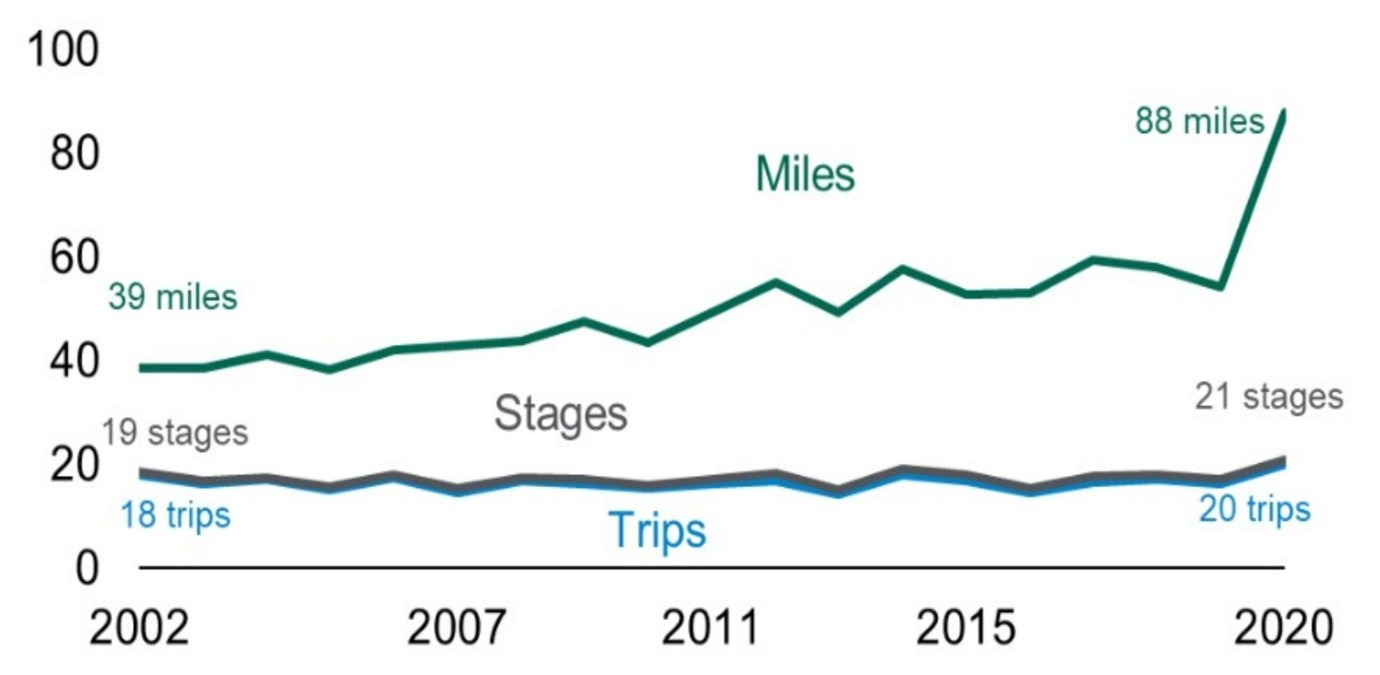Many people discovered their passion for cycling during the pandemic as an alternative exercise form and mode of transportation. As employees start to go back to the office, companies should consider promoting cycling as part of their business’ environmental, social and governance (ESG) credentials.
The cycling boom
The bicycle industry struggled to keep up with a spike in demand for their products during the pandemic, driven by the closure of gyms and bans or restrictions on other leisure activities.
During the pandemic, cycling activity reached the highest levels since the start of the data collection, according to the UK’s Department of Transport. Average miles cycled per person increased by 62% between 2019 (54 miles per person) and 2020 (88 miles per person), more than double the average distance in 2002 (39 miles per person).
Cycling stages, trips and miles per person per year, 2002 to 2020

Source: Department of Transport (opens a new window)
(Cycling stage is when someone cycles as part of an overall trip/cycling trip constitutes the longest stage in the trip by distance.)
Because working from home prevailed during the year of data collection, cycling stages for utility (for example, to place of work or education) decreased by 20% in 2020. This was, however, offset by a 75% increase in cycling stages for leisure. As city centres remained fairly empty during the pandemic, many governments invested in safer spaces for cyclists. Now that social distancing rules are being relaxed and employees are at least partially coming back to the office, businesses can improve their staff’s wellbeing by promoting an environmentally friendly commute to work.
Environmental benefits
Choosing cycling over other means of transportation helps curb greenhouse gas emissions and air pollutants such as nitrogen dioxide and particulate matter. An increase in cycling traffic will also add pressure on governments to create more car-free spaces and greener cities. Car free zones do not only reduce noise pollution and congestion but can also offer space for trees and plants which take some of the carbon dioxide out of the air. Keeping the momentum created during the pandemic may result in a ‘new normal’. The more people join this trend, the stronger the demand for better access to safe, traffic-free environments.
Physical health benefits
By swapping short car journeys or public transport trips with cycling, employees can easily build exercise into their day and reap the health benefits. Cycling helps stay active, and this lifestyle change may inspire others. While physical activity isn’t a guarantee against all diseases, it reduces the chances of several serious illnesses, such as the risk of developing heart and circulatory diseases or type II diabetes. Cycling raises the metabolic rate, which also helps keep weight off. Keeping active can also help to prevent many types of cancer (opens a new window) including, breast, bowel and womb cancer, according to Cancer Research UK.
Mental health benefits
Commuting by bicycle fits exercise into employees’ daily routine and studies have shown that physical activity helps overcome and even prevent depression and anxiety.
Physical activity can be as effective as medication and counselling, according to the Mental Health Foundation (opens a new window), as it helps boost a person’s mood. Exercise like cycling can lower the levels of your body’s stress hormone cortisol. Getting on a bike can relieve tension in one’s body and release ‘feel-good’ hormones known as endorphins. These hormones help to relax one’s mind and make you feel happier. Getting active can make you feel more positive and better about yourself, especially as you improve and meet your goals. Cycling can help reduce worries and anxiety as it gives your brain something else to focus on. Those who regularly cycle have a significantly lower risk of feeling stressed, according to research (opens a new window).
While the brain tends to get a bit slower with age, regular exercise like cycling can help delay this process and also protect against dementia, mood swings and memory loss, according to research (opens a new window). Just 30 minutes of exercise can boost your memory and keep your mind sharp. While any form of exercise is good for you, studies show that exercising outdoors or in nature is even better for your mental health.
Promoting cycling as an employer
Encouraging employees to cycle to work can result in a healthier, more productive workforce, and may even help reduce the levels of staff absenteeism. Furthermore, it helps to tackle the business costs of congestion, reduce an organisation's impact on the local and wider environment and even attract some tax incentives.
There are a number of ways in which an employer can become cycle-friendly, according to Cycling UK (opens a new window):
Communicate regularly with staff (opens a new window) about cycling
Consider holding regular cycling workplace challenges
Take part in events such as Bike Week (opens a new window) or Cycle to Work Day (opens a new window)
Offer a range of tax incentives
Introduce a ‘green’ travel plan
Offer office bikes (opens a new window), otherwise known as ‘pool’ bikes
Support cycling to work by offering shower, changing and drying facilities
Provide safe, secure and convenient cycle parking facilities (opens a new window)
Create a leader board for various cycling related activities
Offer loan of cycles/safety equipment/ (e.g. helmets, reflective clothing, child seats etc)
The Cycle to Work Scheme (opens a new window) allows employers to rent cycles for commuting purposes to staff, who then pay less tax
The Cycling UK guide to tax incentives (opens a new window) goes into more detail.
Share useful material with staff such as the Cycling UK cycle route planner (opens a new window)
Consider becoming an accredited cycle friendly employer (opens a new window)
Some employers may be reluctant to promote cycling actively because they worry about liability issues, but Cycling UK argues (opens a new window) that:
1. cycling is not an unduly risky activity
2. that it is not the employer who's putting people at the risk by promoting cycling and that the threat comes from hostile road conditions (e.g. bad driving, poor infrastructure etc)
3. By encouraging cycling rather than driving, employers are making road conditions safer because cyclists do very little harm to other road users.
4. The health benefits of cycling far outweigh the risks involved
The aim of cycle safety policies and initiatives should be to encourage more as well as safer cycling, in order to maximise its health, environmental and other benefits, and to improve overall safety for all road users.
For further information, please contact:
Andrew Simpson, Vice President Employee Benefits
T + 44 7584 261949
E andrew.simpson@lockton.com


